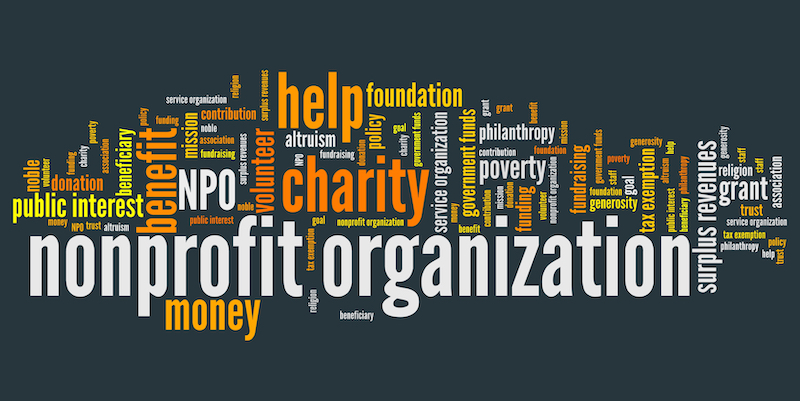To understand the context and focus of a Online Nonprofit MBA, let’s get a good overview of the width and breadth of the sector.

Nonprofit Organizations
A nonprofit organization focuses on supporting a social cause. It advocates for something by reinvesting all resources and revenue into its mission. The Peabody Education Fund was the first significant independent foundation in existence. It was created in 1867 as a pool of resources a select group of donors provided to support charitable activities.
Today, there are over 1.5 million nonprofit organizations in the United States. There are also nearly 30 unique categories of nonprofits. Nonprofits include
- social advocacy groups,
- trade organizations,
- foundations, and
- public charities.
Most nonprofits are set up as tax-exempt organizations, according to the IRS. Depending on their designation, these organizations abide by particular rules. These rules pertain to electioneering, eligibility, lobbying, and tax-deductible status and contribution management.
The IRS’s Publication 557 explains all rules and regulations required for organizations to qualify for tax exemption. The document features extensive information. It explains how to apply, get approved, and adhere to the requirements for tax-exempt status. It also has an overview of all different types of designations—chapters three and four list these 501(c)(3) organizations.
Criticism of Nonprofit Organizations
Some have criticized nonprofits for being ineffective or worthless because of their perceived inability to solve problems effectively. They are restricted by rules and regulations from
- sponsors,
- boards,
- the government, or
- grants regarding nonprofits.
Others argue that nonprofits contribute to poor ethics by providing tax savings and protecting assets for the wealthy.
One of the reasons for the “nonprofits are worthless” perspective is that critics believe the organizations fail to initiate and maintain effective change. A primary reason for this was the stance that frugality determines morality. In 2013, activist and entrepreneur Dan Pallotta shared a TED Talk. It presented the notion that charities should be recognized for their accomplishments instead of how little they spend doing them. This talk became popular and led to sector-wide adjustments.
Misconceptions of Nonprofit Organizations

Some nonprofit organizations suffer through many misconceptions. Another TED Talk, led by civil rights lawyer Areva Martin, reframes the notion that there is no profit within nonprofits. She effectively explains that nonprofits can provide excellent value to their communities. But value only happens when nonprofits have solid leadership. The three elements of successful nonprofit management are
- effective leadership,
- wise financial management, and
- outstanding fundraising.
Many leadership skills ingrained in the business sector seamlessly transfer into nonprofit management. Traits like flexibility, sound people skills, organizational influence, and communication with stakeholders are all needed components. Nonprofit managers do well to understand that a nonprofit is a unique type of organization. It is distinct from both government and business, but simultaneously intertwined with them as well.
What is the History of Nonprofit Management?
To understand modern nonprofit organizations, it’s essential to realize the historical context they originated from.
The Birth of Nonprofit Practices
Highly defined labor unions and sweeping labor reforms were a hallmark of the late 1800s to the early 1920s. However, this period was also characterized by a growing upper class in the United States with resources to spend on causes. Andrew Carnegie, John D. Rockefeller, and Henry Ford were titans of industry at that time. However, it should be noted that many of these business leaders, like Carnegie, were known for paying their employees significantly low wages with no safety procedures and oversight. With their earnings, they were able to give to the poor through philanthropic foundation establishment.
The Cleveland Welfare Council of 1914 became the nation’s first federated fund. It was created to build community and cut down on competition between charities. Federated funds were collected and distributed funds to all its active organizations.
In 1917, the U.S. government passed the War Revenue Act. It gave taxpayers the option to deduct charitable contributions from their tax liability. The logic behind the deductions was that citizens’ donations supported projects that the government would otherwise pay for. By the mid-1930s, the law grew to include corporations. During World War II, Americans started fundraising for relief programs, like the advent of a war-related blood donor program initiated by the American Red Cross.
Nonprofits from the New Deal Era into the 1960s

One result of FDR’s New Deal was that the wealthy became responsible for more tax liability. This reality shifted funding for nonprofits into the public sector. Because the rich were being taxed at a higher rate, they had less wealth and less motivation to give money away for the common good of humanity. But many in corporate leadership put their ample resources into foundations. These were not tax-liable and continued to fund the nonprofit sector.
The U. S. government passed the Tax Reform Act in 1969. It established Section 501(c)(3). It marked the beginning of it becoming more involved in the nation’s welfare programs. Many organizations made an immediate rush for 501(c)(3) status. This created what is now considered the nonprofit sector. The five percent rule was established that same year. It deemed that foundations must contribute at least five percent of their revenue to nonprofits to qualify for tax exemptions.
How the 1970s to 1990s impacted Nonprofit Organizations
The Tax Reform Act resulted in questions being raised about the role of philanthropy. This led to 1973’s Commission on Private Philanthropy and Public Needs. It was funded by a $200,000 grant from the Rockefeller family. This commission was also known as the Filer Commission, as Aetna Insurance’s John Filer chaired it. They spent two years running 85 studies and writing 240 pages of recommendations. Their data identified a “third sector” that was distinctly unique from government institutions and for-profits. This third sector operated through private funding and was a key player in American society. The Filer Commission made many recommendations as to how to keep the sustainability and integrity of these organizations.
One year after the Filer Commission’s report was released, the government passed a bill. It allowed nonprofits to designate up to a million dollars annually for lobbying. Thus giving them the power to steer both the for-profit sector and the government.
1980 saw the advent of the Independent Sector as a community of nonprofits and foundations of all shapes and sizes. Independent Sector’s mission is to connect all third-sector organizations and provide
- resources,
- education, and
- leadership development to the workforce.
Spanning from the 1976 bill that permitted nonprofit lobbying, the Independent Sector was also equipped to aid the sector in influencing public policy through lobby efforts.
Through the growth and strengthening of the nonprofit sector, colleges and universities began offering nonprofit management programs in the 1980s. As they make up such a large part of the economy, nonprofits are expected to operate like traditional businesses in many ways. Thus, the advent of the online MBA in Nonprofit Management.
What is an Online Nonprofit MBA?

There are countless social, environmental, and humanitarian issues facing the world today. When confronted by these challenges, many people worldwide express that they care and wish to be a part of the solution. Many of these concerned citizens are moved to financially and physically support charities that deal with these problems. And of this group, some are inspired to get involved by working within the world of nonprofit organizations.
Similar to traditional business leadership, nonprofit management pertains to driving an organization. Leading a not-for-profit means to meet its missional goals via
- organizational governance,
- finance,
- administration, and
- entrepreneurship.
But its sole goal is not to maximizing profits and create fiscal growth in the hand of investors. Instead, a nonprofit manager’s mission is to serve the organization’s charitable goals more efficiently and effectively. This may include
- raising awareness for multiple sclerosis,
- trying to end suicide among LGBTQ young people,
- trying to end world hunger,
- promoting alternative energy,
- rescuing animals, and
- so much more.
Nonprofit Managers
At the heart of Online Nonprofit MBA programs is the development of nonprofit managers. Nonprofit managers worldwide foster success through
- building public awareness,
- effective outreach,
- careful budgeting,
- sourcing revenue, and
- investing in solid employee relationships.
Some of the duties of the nonprofit manager may include
- creating an operating budget,
- managing staff,
- reporting to the board of directors,
- formulating strategic plans,
- ensuring adherence to nonprofit regulations,
- overseeing fundraising, and
- maintaining public relations.
Many nonprofit managers wear several “hats,” depending on the type and size of their entities. At less-developed nonprofits, for instance, a manager may handle both fundraising and oversee outreach. Because of this, nonprofit online MBA programs must cover a wide range of unique job functions.
How Do I Choose the Right Nonprofit Online MBA?

Enrolling in business school and pursuing an online MBA is a worthy endeavor. It does not disqualify a graduate student from working for a social enterprise or leading in the nonprofit sector. Some may erroneously believe that nonprofits and MBAs are about as compatible as fire and ice. These people should think again.
It is true that consulting and finance industries lead the top-10 industry choices for current MBAs. But nonprofits and social enterprises comfortably make the list as well. An MBA has much to contribute to the capable leadership of a nonprofit. Even still, the nonprofit realm faces some key issues when attempting to attract online MBA students. Some graduate students shy away from social enterprise with legitimate concerns about lower compensation, especially when considering the post-educational debt that faces many business school graduates.
While student debt is always a valid concern, professionals can successfully apply their MBA degrees and their business school skills to the social activism world. Here are a few questions to answer when considering an online MBA in nonprofit management:
Question:
Do I need a master’s degree in public policy/administration or an MBA in nonprofit leadership to work in the nonprofit sector?
Answer:
An online MBA program is one of the most versatile advanced business degrees available today. Business school graduates with MBAs work in every field—from real estate to technology to healthcare. The skill sets students acquire in business school can be applied to all industries in all kinds of ways.
Master of Public Policy or Public Administration features a more specific concentration. They focus on policy implementation and analysis. Though they often cover topics including cost-benefit analysis and decision modeling like MBA coursework. Online MBA programs cover broad topics in analysis and management. These are seamlessly applied to the nonprofit world, regardless of an organization’s particular mission.
Question:
As much as I’d love to work in the nonprofit sector, can I afford to go to business school?
Answer:
Business school is a significant investment of money, time, and opportunity cost. Graduate students pursuing an online MBA should be systematic and judicious about financing their business school education. Some schools will support and possibly fund their goals of working for social enterprises.
Harvard Business School features the Leadership Fellow Program. This program places graduates with public-sector and nonprofit organizations. The business school gave each of its 19 graduates a $50,000 grant after graduation. Other prestigious programs, including Stanford’s Graduate School of Business and Duke’s Fuqua School of Business, offer similar incentives.
MBA students should remember their total compensation package includes more than just their salary. The intangible benefits there can be precious. There is satisfaction experienced from contributing to a cause that business professionals care about.
Question:
If I am most interested in being challenged by a rigorous curriculum, will I be compromising by choosing an online MBA in nonprofit management?
Answer:

Performing a quick online search of the biggest charities in the United States reveals massive operations. These include Teach For America and the American Cancer Society. While these organizations are distinct from traditional for-profit businesses, their intricate funding and wide-reach networks benefit significantly from the expertise of MBAs.
Over 10% of Habitat for Humanity’s employees have MBAs. After the 2008 recession, many nonprofits and social enterprises struggled with funding. They found themselves having to refocus their efforts on budget management, efficiency, and resource allocation. With nonprofits, the end consumer doesn’t bring in the money, so the issues of bringing in and utilizing limited funds are real and ongoing.
Dealing with these problems can test nonprofit leaders’ mettle but also prove rewarding. A degree like the online nonprofit MBA gives distance learners the tools they need in foundational business leadership, like
- accounting,
- finance,
- communication,
- analytics,
- technology,
- economics, and
- marketing.
Combining these principles with nonprofit-intensive courses equips graduate students for success in the field.
Question:
If I have an MBA, will nonprofits struggle to see me as a good fit?
Answer:
The stereotypes business school graduates deal with are the same ones that can make them valuable assets to nonprofits. MBA students’ industry knowledge, analytical competence, and research abilities can help develop best practices at any organization they join.
When considering any enterprise—for-profit or nonprofit—business leaders should take the time to research its business model and goals to form solutions. Graduate students should consider internships with social enterprises in the nonprofit sector. This shows commitment and can confirm their desire to pursue the career path. Business school students should look for electives covering nonprofit management topics or consider an MBA with an emphasis on nonprofit or social enterprise.
The Best Online Nonprofit MBA Programs
The following Nonprofit MBA programs are fully online and hold exceptional business accreditation. Accreditation comes from either AACSB, ACBSP, or IACBE. Schools are listed in alphabetical order.
Brenau University

Brenau University’s College of Business & Communication offers nonprofit leaders a fully online MBA in Non-Profit Leadership. This program is accredited by the ACBSP. This shows this program upholds some of the highest standards in business education. Brenau is not just adapting its education to the online platform. They have been paving the way for online degrees for over 20 years. The degree is a great fit for professionals wanting to move to the next level in their nonprofit leadership careers.
Bushnell University

The School of Business, Leadership, and Technology at Bushnell University offers a top online MBA degree with a concentration in Non-Profit Leadership. The online Nonprofit MBA program marries excellence and accessibility. The degree is accredited by the IACBE and is offered fully online. Even their admissions process shows a commitment to accessibility. The Bushnell online MBA does not require GMAT/GRE scores, nor any business or management prerequisites. It is a great choice for applicants looking for a streamlined process.
Chaminade University

The Chaminade University School of Business & Communication offers an IACBE-accredited online MBA with a concentration in Not-for-Profit. This coursework is specifically designed for the unique needs of leaders in the nonprofit sector. All of the coursework is offered online. So, students who already work in nonprofit organizations can fit their studies into their busy schedules. For those professionals wanting to move into leadership in their work with government, communities, or philanthropic organizations, this is a great program.
Coastal Carolina University

The E. Craig Wall Sr. College of Business Administration at Coastal Carolina University offers a fully online MBA degree program. They offer concentrations in Coastal Marine Wetland Studies, Health Care Administration, Commercial and Investment Real Estate, and Nonprofit Management. They offer nonprofit-specific courses in Grant Writing for Nonprofit Organizations, Sustainability and Social Responsibility, and Financial Governance for Nonprofit Board Members. This is a great opportunity for students wanting to grow into leadership positions in the nonprofit world.
Concordia University, Nebraska

The College of Business and Technology at Concordia University, Nebraska offers a great online Nonprofit MBA. It is a 100% online MBA in Nonprofit Management. The nonprofit concentration offers courses in Organizational Resource Development, Nonprofit Management, and Public Program Evaluation. The core courses will then help students build their toolkits in marketing, ethics, communication, data analysis, and organizational behavior. This degree offers the full package for the mission-driven leader.
Drake University

Drake University’s College of Business and Public Administration offers a 36-hour online MBA degree. This program can be completed completely online and offered asynchronously. This type of format offers students the highest flexibility, letting them complete their studies when and where they need to. They offer seven emphasis options, including Public and Nonprofit Management. It is a great choice for prospective students wanting to develop their leadership skills for nonprofit management.
Johnson & Wales University

Johnson & Wales University’s College of Business and College of Professional Studies team up to deliver a top online Nonprofit MBA. It is 100% online and full of career-focused curriculum in the nonprofit sector. The coursework covers important topics in data analysis, decision making, communication skills, global management, and ethics. Students enrolled in this program have their diplomas in hand in as few as 15 months. It is a great choice for busy professionals.
Lindenwood University

Lindenwood University offers an excellent online Nonprofit MBA. The program is offered through the Plaster School of Business & Entrepreneurship. This program checks a lot of boxes. It is ACBSP accredited and has an affordable tuition price. The MBA is also very accessible, with a fully online format and no GMAT/GRE requirement. And for students looking for an accelerated completion timeline, students can finish this program in 15-36 months.
National Louis University

The Graduate School of Business and Leadership at National Louis University offers one of the top online Nonprofit MBA programs around. It holds a business accreditation from IACBE. This shows its commitment to high business education standards. They offer concentrations in Entrepreneurship, Human Resource Management, Accounting, Health Services Administration, Design Thinking, and Nonprofit Management. For nonprofit professionals wanting to develop their skills in creative collaboration, problem-solving, strategy, change management, communication, and management, NLU’s program is a great choice.
Oklahoma State University

Oklahoma State University houses one of the best business schools in the nation, the Spears School of Business. This AACSB-accredited business school offers many programs for busy business students. One of them is a fully-online MBA degree program with a concentration in Nonprofit Management. Not only does this concentration cover topics in business in non-profit organizations and fundraising for non-profits, but it also offers 12 other courses for nonprofit management students to choose from. The depth and breadth of this degree are excellent.
Regent University

Regent University offers a top online Nonprofit MBA degree program through their School of Business & Leadership. Their ACBSP- accredited MBA – Not-for-Profit Management program is offered on their Virginia Beach campus, in a hybrid format, or completely online. Regent knows that nonprofit management is about leadership, business skills, and relationships. And, that is how they focus their advanced business education in this degree. It is a great place for tomorrow’s nonprofit leaders.
Salve Regina University

Salve Regina University’s Department of Business Studies and Economics delivers a top online Nonprofit MBA program. Their MBA can be completed completely online, and it holds IACBE accreditation. Salve Regina’s program offers concentrations in Entrepreneurial Enterprise, Social Ventures, Healthcare Administration, Cybersecurity Issues in Business, and Nonprofit Management. The courses in this concentration include Nonprofit Management, Nonprofit Financial Management, Human Resources Management, and Fundraising and Marketing for Nonprofits.
SUNY Empire State College

SUNY Empire State College offers a top Online Nonprofit MBA through their School for Graduate Studies. This 36-hour degree holds a prestigious IACBE accreditation and can be completed online. The program designers created this curriculum for the modern leader. Students will work on their cross-cultural competency, ethical decision making, problem-solving, communication skills, and leadership. They offer students an extensive list of 10 different concentrations, including Nonprofit Management.
University of Maine

The Maine Business School at the University of Maine is a powerhouse in business education. They offer 13 different MBA programs, three dual degrees, an MS in Engineering and Business, and multiple certificates. Among their offerings is the MaineMBA in Public and Nonprofit Management. This top online Nonprofit MBA holds the gold standard for business accreditation, AACSB. This program stands far above the rest for leadership in public service settings.
Wilmington University

For the professional wanting to climb the ladder of success in nonprofit management, Wilmington University has a top program to consider. Their College of Business offers an IACBE-accredited online MBA. The program has a concentration in Nonprofit Management. Wilmington’s MBA offers an affordability, accessibility, and business education excellence that really stands out. Students get to dive into coursework in strategy, technology, analytics, marketing, finance, and leadership. Students also get to immerse themselves in topics such as Nonprofit Governance, Nonprofit Management, and Nonprofit Sustainability.
How Do I Apply for a Nonprofit Online MBA?
Future business school students wanting to apply to MBA programs will need to gather several application materials. Many MBA programs require that applicants submit these materials online. But don’t worry! They are easily found on the schools’ websites.
For complete applications, admissions offices often request
- official placement test scores from the GMAT or GRE,
- a current resume,
- official transcripts,
- three letters of recommendation,
- a resume,
- answers to several essay questions, and
- an application fee.
The essay questions will vary from school to school. One MBA application essay prompt may ask candidates to imagine introducing themselves to classmates on the first day of MBA class meetings. They may also ask students to describe how they fit within the business school or university’s mission. Then some ask if there is anything not covered in the admission form that admission representatives should know.
Some business schools are interested in more than just a written essay. Boston University’s Questrom School of Business currently requires that MBA candidates produce three video essays when applying to the school’s advanced business program.
Business schools may also ask shortlisted applicants to conduct an application interview. This can be an important part of their MBA application process. A distance option for students to complete the interview online through Skype or another platform is also popular.

How Do I Succeed in a Nonprofit Online MBA?
Business school success requires flexibility, discipline, and a growth mindset.
Flexibility
Flexibility is shown by acting appropriately with others (classmates, staff, and instructors), with openness to understanding and learning despite possessing different styles.
Discipline
Discipline is evident when looking at the best-performing business students. They know how to treat business school like a job. This includes how they are actively being engaged in the courses rather than attending class as passive recipients. Active engagement can be expressed by taking interpersonal risks in class. An example is by being willing to share struggles, failures, and successes. It can also be by taking the initiative in customizing the curriculum to students’ professional goals; i.e. by actively applying the material.
Growth Mindset
A growth mindset means challenging oneself in and out of the classroom while also displaying humility by asking for help, asking questions, and speaking up, all in pursuing a more profound and longer-lasting education. This mindset measures ability by effort and tenacity over pure talent.
Embracing flexibility, discipline, and a growth mindset are the three keys to optimizing business school.
Action Plans
Here are some action plans one can take to begin their journey in nonprofit leadership:
1. Keep Your Eye on the Future of Nonprofit Management
The future of nonprofit management will be as creative and dynamic as the last century has been for nonprofits and their social engagement. The determining factor of where nonprofit management will end up is the relationship between the U.S. government and nonprofits and public/private associations. Stay informed by reading up on the topic and keeping updated on current events.
2. Learn about the Vital Relationship between Nonprofits & the Government
As previously mentioned, nonprofits are the third sector. This is distinct from the government and the business world. Yet, they do not operate in isolation of either. Nonprofits are directly linked to the other two sectors if for no other than financial reasons.
3. Know How Diversity, Equity, and Inclusion Factor In
Like other types of organizations, nonprofits are struggling to keep up in diversity, equity, and inclusion. Approximately ten percent of nonprofit organizations are led by Black or Latino leaders. This is despite the reality that these groups account for one-third of the U.S. population. Nonprofits, like all organizations, are comprised of people with realized and unrealized biases. These biases affect policies and practices.

4. Technology, Technology, Technology
Many nonprofits struggle to stay relevant in the ever-evolving technological world. They often lack the funding needed to make significant investments in new tech. This can hinder the organizations’ capacity to
- keep better data,
- utilize that data to improve programs, and
- tell a better story to inspire volunteers and donors.
But the future of nonprofits depends on new technology.
5. Social Media is a Valuable Tool for Nonprofit Organizations
Few would argue that social media is widely accepted as a needed tool for the nonprofit world. But many nonprofits have yet to learn how to use it effectively. Social media platforms continue to evolve. It remains essential that nonprofit managers grow in their ability to harness their power for the growth and influence of their organization.
As podcasts continue to grow as a form of entertainment and information, nonprofits will do well to take advantage of the communication opportunities these resources provide. One popular podcast is Futures in Fundraising. In this podcast, Alexander Haas describes strategies nonprofits can use through social media outlets in a future-focused mindset when fundraising, maintaining donor relationships, and fostering high-quality community awareness.
No matter what the future holds for nonprofits, they all need to form and operate through a solid strategic plan. Nonprofit managers must take the mantle of helping shape their organizations’ overall goals with a concise strategic plan. Leadership is critical and proper training is yours with a degree like the online MBA in Nonprofit Management.
Related Resources:
Top Online MBA Nonprofit Specializations
Guide to Online MBA
Alternatives to an Online MBA
